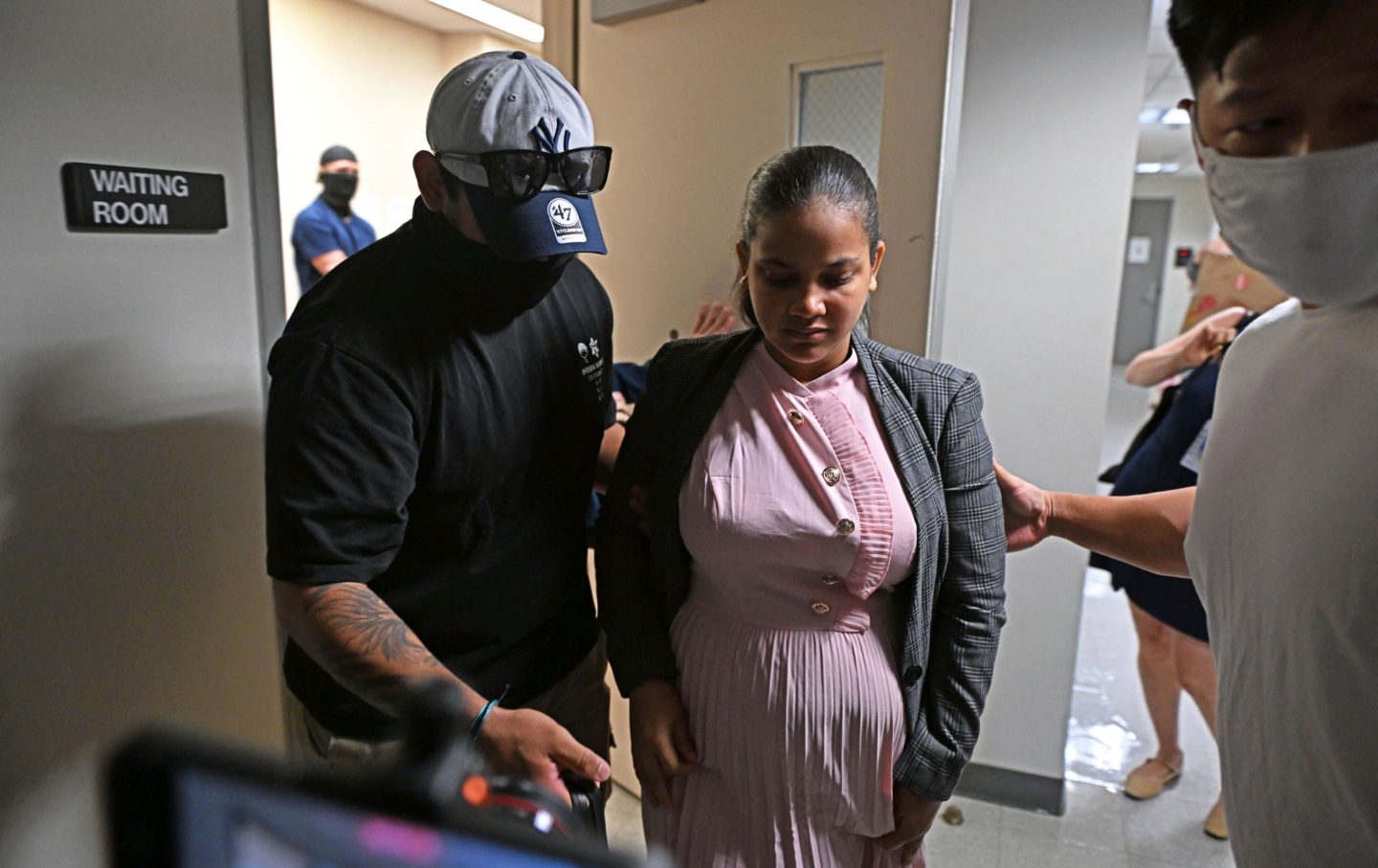Fearing Legal Threats, Doctors Are Performing C-Sections in Lieu of Abortions
Some physicians are doing unnecessary and invasive surgery on pregnant patients “to preserve the appearance of not doing an abortion.”

Surgeons performing a “classic cesarean section.”
(Photo: Natthawon Chaosakun via Shutterstock)When news that Lizelle Gonzalez was suing the local prosecutor’s office for more than $1 million in damages, after being falsely imprisoned for murder over an attempted self-managed abortion in 2022, reproductive rights advocates cheered the move as a pathway to justice for the wrongfully charged southern Texas woman. However, a revelation in the lawsuit gave them pause: At the same hospital that reported her self-induced abortion to authorities, Gonzalez underwent a “classical C-section” for the delivery of her stillborn child, instead of abortion care. Major invasive surgery, Cesarean sections carry much higher risk for health complications, like hemorrhaging, compared with D&E abortion, and can jeopardize subsequent pregnancies.
Nancy Cárdenas Peña, a longtime Rio Grande Valley reproductive justice advocate and campaign director for Abortion On Our Own Terms, which works to expand access to self-managed abortion, says that detail is new—and “disturbing”—information to the Texas activist groups that quickly mobilized following her arrest to advocate for her release from jail.
“It’s really alarming and something I’m still trying to wrap my head around,” Cárdenas Peña tells The Nation. “While the medical details are sealed so we don’t know exactly why this was performed, a C-section is not necessary for any sort of abortion management. A C-section carries a lot of risk, and it’s not something that should be happening. I’m still a bit in shock.”
As the threat of criminal prosecution looms over doctors and hospitals in the 15 states where abortion is illegal, medical professionals, erring on the side of extreme caution because of vaguely worded laws and few meaningful exceptions, are resisting abortion care, even in life-threatening circumstances. Fear of lawsuits, loss of medical licenses, hefty fines, and considerable jail time have driven doctors to jeopardize patient care, either by delaying or denying pregnancy termination. And as we now know, this also has meant performing medical procedures that imperil patients, including substituting C-sections for abortion care, an emerging pattern researchers and abortion providers say will only increase over time.
“I cannot imagine that Lizelle is the only person who has experienced this. There are surely other people in not just Texas but other abortion-hostile states,” says Cárdenas Peña, who has been working on behalf of people who have abortions for over a decade. “Her story is likely the tip of the iceberg.”
Indeed, Texas physicians reported in a June 2022 New England Journal of Medicine study that their colleagues have “resorted” to using hysterotomy—a surgical incision in the uterus—because it “might not be construed as an abortion.” The study examines the dire impact of Texas’ Senate Bill 8, a near-total ban that went into effect months before the fall of Roe v. Wade, after which the state’s trigger law took effect and banned abortion outright except in limited circumstances. One Texas ob-gyn described this practice as going “back to doing what they used to do before there was a D&E provider in town.” In another study tracing the impact of SB 8 published in Obstetrics and Gynecology, at least one doctor reports being “advised to try multiple interventions to avoid a procedural abortion” for a patient who was facing severe pregnancy complications, despite those procedures’ being “substandard” methods of care. Even with the patient septic, which is a life-threatening infection, the initial recommendation was still not termination–it was hysterotomy. “I’ve never done that and that morbidity is going to be insane,” the physician told researchers.
Dr. Ghazaleh Moayedi, ob-gyn, abortion provider, and coauthor of the Texas-based studies, says she and colleagues continue to hear these chilling hysterotomy stories from across the state. It is significantly safer to end a pregnancy by abortion than by C-section or hysterotomy, she stresses.
We know that abortion care is up to 14 times safer than childbirth. And maternal mortality and medical problems after a C-section are nearly five times that of vaginal births, especially the risks of hemorrhage and sepsis. The incision carries a multitude of health repercussions, including potentially never being able to have a vaginal birth, which have fewer complications and risks, and increased risk of surgical complications with each future C-section.
“You are not only cutting into someone’s body needlessly and putting them at risk for hemorrhage, infection, and more, but forcing them to have long-lasting and recurring pregnancy complications,” says Moayedi, board chair with Physicians for Reproductive Health. “This has a deep impact on someone’s reproductive life and future.”
Some patients have been pushed into the surgery by delays in care caused by abortion law. In January 2023, Kylie Beaton, a 33-year-old Texas woman, learned that her fetus would not survive birth. A devastated Beaton was denied abortion and tried to seek care out of state but soon learned that few clinics provide the procedure past 24 weeks; the prohibitive cost would be more than $10,000. Ultimately, she was forced to undergo C-section against her preference. She spent weeks recovering from the surgery, and doctors told her she would need to wait up to 18 months to get pregnant again to give the uterus time to heal from the incision. Beaton, who is now part of a lawsuit against Texas seeking clarity on the law’s medical exceptions, worries for her health and her ability to get pregnant again in the future.
“I know this is happening in Texas,” says Moayedi. “And I’m certain it’s happening all across the country.”
Glaring evidence of this trend has recently come out of neighboring Louisiana, which has barred abortion care since 2022. As first reported by NPR in March, a study from Physicians for Human Rights, the Center for Reproductive Rights, Lift Louisiana, and Reproductive Health Impact, interviewed 30 healthcare providers and 13 patients last year who shed light on how the state was home to dangerous disruptions in pregnancy care. Among the most extreme findings, researchers discovered that patients who were experiencing preterm premature rupture of membranes—when water “breaks” early in the pregnancy before the fetus is viable—were forced to undergo C-section surgeries instead of receiving an abortion procedure or medication to terminate their pregnancy. The invasive surgeries were done “to preserve the appearance of not doing an abortion,” due to fear of criminal penalties, according to the study.
“It was a bit of an unexpected—and horrifying—finding,” Dr. Michele Heisler, study coauthor, Physicians for Human Rights medical director, and professor of public health at University of Michigan, tells The Nation. “In these instances the patients were not given a choice. To subject them to risky, major abdominal surgery is not only unnecessary—it’s cruel, it’s essentially torture. And it’s just unconscionable.”
Both Moayedi and Heisler point to a factor that is exacerbating this trend: an exodus of abortion skills and expertise. Even before Dobbs, decades of anti-abortion policies systemically deterred ob-gyns from abortion training, to a point where not learning how to do procedures like D&E became acceptable, says Moayedi, despite their being integral to comprehensive pregnancy care. In fact, while the American College of Obstetricians and Gynecologists recommends that medical schools teach abortion, students can opt out of the education. Receiving abortion training already felt like an uphill battle to many. The ob-gyn field overall was already facing shortages prior to Dobbs, with an estimated 4.7 million women living in areas with limited maternity care access. In the wake of bans that carry steep criminal penalties, dozens of ob-gyns who hold those expertise are retiring or fleeing to states where abortion is legal, putting pregnant patients in the remaining states in peril.
Popular
“swipe left below to view more authors”Swipe →And the future of that skilled knowledge is in jeopardy: Following Dobbs, 14 percent of residency programs lost in-state abortion training. And even in states with legal abortion, 46 percent of programs lack routine training, according to a 2023 Contraception study. A survey conducted last year of more than 2,000 physicians and trainees, including medical students and residents, found that 76 percent would refuse to apply for programs in states that restrict abortion. Additionally, research from the Association of American Medical College shows doctors applying to residency programs are more likely to avoid practicing in states with abortion restrictions.
“There are overwhelmingly fewer and fewer doctors who have the training to perform abortion care. And the laws are making this worse,” says Moayedi. “So what do [these doctors] do? The only thing they know how: a C-section, which of course threatens patient safety, especially for someone facing an emergency like sepsis. It’s truly a nightmare scenario.”
And those who remain in abortion-hostile states must contend with ethical dilemmas that pit their livelihoods against their better medical judgment. Nearly all ob-gyns interviewed said they found themselves barred from following clinical standards by legal constraints, according to a January study published in the Journal of the American Medical Association. Navigating this gray area has led to “moral distress” and is accelerating mental health disorders among physicians.
“Forcing C-sections given these heightened health risks really violates the core of medical ethics to do no harm,” says Payal Shah, PHR program director and coauthor of the Louisiana study. “But right now doctors are living in constant fear of providing basic and sometimes life-saving health care because of legal threats.”
The decision to perform a C-section in lieu of abortion care is one that anti-abortion advocates not only applaud but explicitly recommend. For instance, the Charlotte Lozier Institute, a large and influential anti-abortion group, writes that “cesarean section may be a more appropriate method of separation” than abortion, because it “shows greater respect for the human dignity of the fetus, even if she is too young or sick to survive.” The American Association of Pro-Life OBGYNs, the largest organization of its kind in the world, recommend cesarean section – which they define as “morally good” as it “does not dismember” the fetus. “Many physicians are repelled by the idea of performing a cesarean section in order to avoid dismembering the fetus. However, it is AAPLOG’s position that classical cesarean delivery should not cause more repulsion than dismemberment or disarticulation of a living human fetus,” they write in their ethical guidelines, nonetheless.
Dr. Daniel Grossman, an abortion provider and the director of Advancing New Standards in Reproductive Health at the University of California San Francisco, where he also teaches, says we may look to Latin America as a possible harbinger of what’s to come. While the Green Wave movement has succeeded in expanding abortion rights in recent years, the area is historically home to some of the most draconian abortion bans in the world. Several reports out of Latin America show that performing a C-section was somehow “more acceptable” than performing an abortion, he says. Grossman points to a high-profile 2013 case in which an El Salvadoran woman, suffering a life-threatening pregnancy, was denied abortion care and instead underwent a C-section, as a way for physicians to circumvent the ban. Her story has served as a rallying cry to repeal restrictive laws. In Argentina, doctors denied an 11-year-old rape victim’s request for an abortion in 2019, instead forcing a C-section, which local pro-choice groups described as “torture.”
Reproductive health experts predict these cases will become more common across the US in the post-Roe era. This will be especially true if the US Supreme Court finds that the federal protections for hospitals treating emergency abortion care under the Emergency Medical Treatment & Labor Act do not supersede state abortion law, a question justices will confront in Idaho v. US this month. The high court will determine whether doctors can intervene with abortion care during high-risk, emergency situations—or force patients to suffer, which, as now documented, can include unnecessary, invasive, and dangerous procedures.
“We are certainly going to see more of this happening in abortion-banned states,” says Heisler. “We have these punitive laws instilling fear in doctors and are losing medical abortion expertise. It’s a dangerous combination that is creating a terrifying new reality.”








